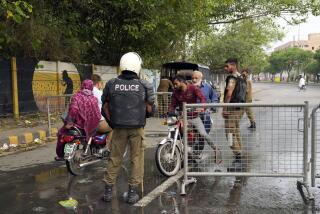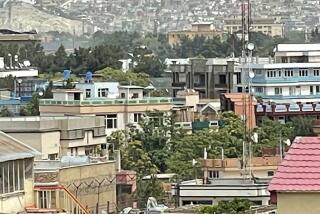Neighbors startled that terrorist lived, died among them
ABBOTTABAD, PAKISTAN — Perhaps nothing was as surprising in the hunt for Osama bin Laden as the last place he chose to hide.
The sprawling compound is hemmed by a forested ridge and a quiet neighborhood of pastel-colored homes adorned with columns and terrazzo porches -- a far cry from the caves or rough tribal lands where most people thought the Al Qaeda leader might be.
The city of Abbottabad itself is known not for any connections to Islamic militants but for its mountain breezes, well-kept avenues and educational institutions, including Pakistan’s most renowned academy for military officers.
Residents of the adjacent Bilal Town neighborhood acknowledge they were curious about what went on on the other side of the high walls laced with barbed wire. It appeared as a fortress with a white structure at its heart.
All they really knew was that security cameras spied on anyone who approached. And except for a stout man driving a red van, they never saw anyone coming or going.
They got their answer early Monday when low-flying helicopters carrying the American forces coming for Bin Laden rattled their windows, waking them up. Then, the shooting started.
Later in the day, the compound was hidden behind a high, red screen. Pakistani soldiers restricted access at a checkpoint about a mile down the road. A truck hauled the burned wreckage of a helicopter out of the neighborhood.
“It’s shocking to realize there was an internationally known terrorist living here,” said Saifullah Zarsheed, who lives a couple of hundred yards from the compound where Bin Laden was killed. “But when you look at the place, it was a very suitable place for him and his people.”
The Pakistani military, which the Obama administration says it kept in the dark about the mission, made sure Monday that throngs of journalists stayed at a distance. The screen erected around the compound’s perimeter cordoned off the grounds. But a passage through alleys and lanes led to a rooftop about 200 yards away, from which dozens of soldiers could be seen walking in and around the site.
Abbottabad, center of a district of the same name, has a look and feel that’s light-years from the caves of Tora Bora in eastern Afghanistan, where Bin Laden first fled after the Sept. 11 attacks nearly a decade ago. Nor is it anything like the rugged terrain of Waziristan, the tribal border area where Al Qaeda had continued to plan and operate with the help of local Taliban militants -- and where many people thought Bin Laden was hiding.
Abbottabad residents say proudly that their small city doesn’t know the sound of suicide bombings or the scourge of assassinations.
Its streets are dotted with colleges and military installations, the most famous of which is the Pakistan Military Academy, the country’s most renowned training center for officers. Hotels abound, a testament to the area’s lure as a summer vacation destination far from the brutal heat of Karachi or Multan. The city is named for James Abbott, a British colonial officer who founded it in 1853.
“Abbottabad is such a peaceful city -- I can’t ever recall a terrorist incident happening here, and this isn’t a place where there ever has been any militant activity,” said Shehryar Khan, a 21-year-old college student.
The fact that Abbottabad has such a significant military footprint raises questions about whether some in Pakistan’s security establishment were aware of Bin Laden’s presence. Washington has long suspected that factions within Pakistan’s security establishment were aware of his whereabouts and failed to act on that knowledge. Pakistani officials have denied those claims.
At least one other high-profile Al Qaeda operative has used Abbottabad, 35 miles north of the capital, Islamabad, as a haven. Earlier this year, Umar Patek, an Indonesian militant, was arrested there with the help of a CIA tip.
President Obama said the U.S. learned in August that Bin Laden might be in Abbottabad, but it was not clear how long he had been there.
The fact that Bin Laden sought refuge in an urban setting reflects a recent change in strategy by militant leaders to leave strongholds in the tribal areas, which have been hit hard by America’s campaign of drone strikes.
Karachi, Pakistan’s largest city, has increasingly become a hub for Afghan Taliban leaders.
Abbottabad residents said Monday that they had wondered often about the large compound and gossiped about who might live behind its high gray walls, some as high as 18 feet.
“We’ve been here for only a month, but neighbors who had been here for years told us they could never figure out who was living there,” said a young man standing on the rooftop a distance from the site. He declined to give his name. “This whole city is such a high-security zone. How could someone like that hide here?”
Sometime between midnight Sunday and 1:15 a.m. Monday, the residents of Bilal Town awoke to the sounds of helicopters hovering so low that windows rattled, said Khan, the college student.
Minutes later, residents heard bursts of gunfire and the sounds of rocket-propelled-grenade explosions. “Then suddenly there was a flash and a big bang,” said an older man who lives in the neighborhood and spoke on the condition he not be named. “Everyone ran out of their houses.”
Footage from Pakistani television showed the compound’s main building partially in flames. A neighborhood boy, 13-year-old Usama Ali Sayed, said he saw one of the helicopters ablaze as it crashed to the ground.
In Abbottabad, residents expressed skepticism that Bin Laden’s death would deal a major blow to Al Qaeda.
In addition to targeting the West, the terrorist network has also helped Pakistani militant groups carry out attacks on Pakistani soil because it regards Islamabad as subservient to Washington.
“This won’t make any difference,” said Faheem Hamid, 24, a college student. “He was only one terrorist. Yes, he’s killed, but anyone can replace him. Al Qaeda will still be there.”
Elsewhere in Pakistan, reaction to news of Bin Laden’s death hewed to longstanding rifts between Western-minded political parties and leaders and followers of the country’s hard-line Islamic clerics.
The Pakistani government, led by President Asif Ali Zardari, hailed Monday’s operation as “a major setback to terrorist organizations around the world.” Speaking at the Assembly of Khyber-Pakhtunkhwa province, which includes Abbottabad, Senior Minister Bashir Ahmed Bilour, a Zardari ally, told lawmakers: “Thank God we are rid of this scourge. Bin Laden was supplying our children in the Swat Valley with suicide jackets, guns and explosives.”
But in the same chamber, Mufti Kifayetullah, a lawmaker with Islamist leader Maulana Fazlur Rehman’s Jamiat Ulema-i-Islam faction, called on Muslims to regard Bin Laden as a hero.
“Today, Americans have killed a great hero of Islam,” Kifayetullah said. “Americans should keep in mind that they have killed Osama, but they cannot eliminate his ideology.”
Many Pakistanis said they were happy that Bin Laden had been killed, but they worried that Pakistan would bear the brunt of a wave of revenge attacks.
“There will be more unrest with his death,” said Israr Hussain, a 23-year-old salesman at a bookstore in Islamabad. “There will be reaction from Bin Laden’s friends, and there could be more pressure from the U.S. on Pakistan to finish off his associates.”
Special correspondents Nasir Khan in Islamabad and Zulfiqar Ali in Peshawar, Pakistan, contributed to this report.
--
Times staff contributors
Contributing to the coverage of Osama Bin Laden’s death from the Washington and New York
bureaus were Neela Banerjee, Geraldine Baum, Brian Bennett, David S. Cloud, Ken Dilanian,
Bob Drogin, Kim Geiger, Matea Gold, Tom Hamburger, Kathleen Hennessey, Lisa Mascaro,
Melanie Mason, Michael A. Memoli, Peter Nicholas, James Oliphant, Christi Parsons, Paul
Richter, Richard A. Serrano, Richard Simon, Katherine Skiba and Tina Susman.
More to Read
Sign up for Essential California
The most important California stories and recommendations in your inbox every morning.
You may occasionally receive promotional content from the Los Angeles Times.










